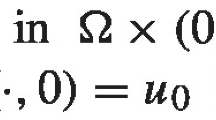Abstract
We settle the open question concerning the Harnack inequality for globally positive solutions to non-local in time diffusion equations by constructing a counter-example for dimensions \(d\ge \beta \), where \(\beta \in (0,2]\) is the order of the equation with respect to the spatial variable. The equation can be non-local both in time and in space but for the counter-example it is important that the equation has a fractional time derivative. In this case, the fundamental solution is singular at the origin for all times \(t>0\) in dimensions \(d\ge \beta \). This underlines the markedly different behavior of time-fractional diffusion compared to the purely space-fractional case, where a local Harnack inequality is known. The key observation is that the memory strongly affects the estimates. In particular, if the initial data \(u_0 \in L^q_{loc}\) for q larger than the critical value \(\tfrac{d}{\beta }\) of the elliptic operator \((-\Delta )^{\beta /2}\), a non-local version of the Harnack inequality is still valid as we show. We also observe the critical dimension phenomenon already known from other contexts: the diffusion behavior is substantially different in higher dimensions than \(d=1\) provided \(\beta >1\), since we prove that the local Harnack inequality holds if \(d<\beta \).
Similar content being viewed by others

References
Barlow, M.T., Bass, R.F., Chen, Z.-Q., Kassmann, M.: Non-local dirichlet forms and symmetric jump processes. Trans. Am. Math. Soc. 361(4), 1963–1999 (2009)
Bass, R.F., Levin, D.A.: Transition probabilities for symmetric jump processes. Trans. Am. Math. Soc. 354(7), 2933–2953 (2002)
Bonforte, M., Sire, Y., Vázquez, J.L.: Optimal existence and uniqueness theory for the fractional heat equation. Nonlinear Anal. 153, 142–168 (2017)
Bonforte, M.V., Juan, L.: A priori estimates for fractional nonlinear degenerate diffusion equations on bounded domains. Arch. Ration. Mech. Anal. 218(1), 317–362 (2015)
Caffarelli, L., Silvestre, L.: An extension problem related to the fractional Laplacian. Comm. Partial Differ. Equ. 32(7–9), 1245–1260 (2007)
Caffarelli, L., Silvestre, L.: Regularity theory for fully nonlinear integro-differential equations. Comm. Pure Appl. Math. 62(5), 597–638 (2009)
Caffarelli, L., Silvestre, L.: Hölder regularity for generalized master equations with rough kernels. In: Advances in analysis: the legacy of Elias M Stein, vol. 40, pp. 63–83. Princeton University Press, Princeton, NJ (2014)
Caputo, M.: Diffusion of fluids in porous media with memory. Geothermics 28(1), 113–130 (1999)
Chang-Lara, H.A., Dávila, G.: Hölder estimates for non-local parabolic equations with critical drift. J. Differ. Equ. 260(5), 4237–4284 (2016)
Chen, Z.-Q., Kumagai, T.: Heat kernel estimates for stable-like processes on \(d\)-sets. Stoch. Process Appl. 108(1), 27–62 (2003)
Eidelman, S.D., Kochubei, A.N.: Cauchy problem for fractional diffusion equations. J. Differ. Equ. 199(2), 211–255 (2004)
Erdélyi, A., Magnus, W., Oberhettinger, F., Tricomi, F.G., Bateman, H.: Higher transcendental functions, vol. 1. McGraw-Hill, New York (1953)
Grafakos, L.: Classical and modern Fourier analysis. Pearson Education Inc, Upper Saddle River (2004)
Henry, B.I., Langlands, T.A.M., Wearne, S.L.: Anomalous diffusion with linear reaction dynamics: from continuous time random walks to fractional reaction-diffusion equations. Phys. Rev. E 74, 031116 (2006)
Jakubowski, V.G.: Nonlinear elliptic-parabolic integro-differential equations with \(L^1\)-data: existence, uniqueness, asymptotics. PhD thesis, Universität Duisburg-Essen, Fakultät für Mathematik (2002)
Jia, J., Peng, J., Yang, J.: Harnack’s inequality for a space-time fractional diffusion equation and applications to an inverse source problem. J. Differ. Equ. 262(8), 4415–4450 (2017)
Kassmann, M.: A new formulation of Harnack’s inequality for nonlocal operators. C. R. Math. Acad. Sci. Paris 349(11–12), 637–640 (2011)
Kemppainen, J., Siljander, J., Vergara, V., Zacher, R.: Decay estimates for time-fractional and other non-local in time subdiffusion equations in \({\mathbb{R}}^d\). Math. Ann. 366(3–4), 941–979 (2016)
Kemppainen, J., Siljander, J., Zacher, R.: Representation of solutions and large-time behavior for fully nonlocal diffusion equations. J. Differ. Equ. 263(1), 149–201 (2017)
Kilbas, A.A., Saigo, M.: H-Transforms. Theory and Applications, vol. 9 of Analytical Methods and Special Functions. Charman and Hall/CRC, Boca Raton, Florida (2004)
Kim, K.-H., Lim, S.: Asymptotic behaviors of fundamental solution and its derivatives related to space-time fractional differential equations. J. Korean Math. Soc. 53(4), 929–967 (2016)
Kim, Y.-C., Lee, K.-A.: Regularity results for fully nonlinear parabolic integro-differential operators. Math. Ann. 357(4), 1541–1576 (2013)
Meerschaert, M.M., Alla, S.: Stochastic Models for Fractional Calculus. In: De Gruyter Studies in Mathematics, vol. 43. Walter de Gruyter GmbH & Co., Berlin (2012)
Meerschaert, M.M., Benson, D.A., Scheffler, H.-P., Becker-Kern, P.: Governing equations and solutions of anomalous random walk limits. Phys. Rev. E 66, 060102 (2002)
Metzler, R., Klafter, J.: The random walk’s guide to anomalous diffusion: a fractional dynamics approach. Phys. Rep. 339(1), 1–77 (2000)
Prüss, J.: Evolutionary integral equations and applications, reprint of the 1993 edition. Modern Birkhäuser Classics. Birkhäuser/Springer Basel AG, Basel (2012)
Zacher, R.: Maximal regularity of type \(L_p\) for abstract parabolic Volterra equations. J. Evolut. Equ. 5(1), 79–103 (2005)
Zacher, R.: The Harnack inequality for the Riemann–Liouville fractional derivation operator. Math. Inequal. Appl. 14(1), 35–43 (2011)
Zacher, R.: A weak Harnack inequality for fractional evolution equations with discontinuous coefficients. Ann. Sci. Norm. Super Pisa Cl. Sci. 12(4), 903–940 (2013)
Acknowledgements
J. S. was supported by the Academy of Finland Grant 259363 and a Väisälä foundation travel Grant. R. Z. was supported by a research grant of the German Research Foundation (DFG), GZ Za 547/4-1.
Author information
Authors and Affiliations
Corresponding author
Additional information
Publisher's Note
Springer Nature remains neutral with regard to jurisdictional claims in published maps and institutional affiliations.
Rights and permissions
About this article
Cite this article
Dier, D., Kemppainen, J., Siljander, J. et al. On the parabolic Harnack inequality for non-local diffusion equations. Math. Z. 295, 1751–1769 (2020). https://doi.org/10.1007/s00209-019-02421-7
Received:
Accepted:
Published:
Issue Date:
DOI: https://doi.org/10.1007/s00209-019-02421-7
Keywords
- Non-local diffusion
- Harnack inequality
- Riemann–Liouville derivative
- Fractional Laplacian
- Fundamental solution
- H functions
- Asymptotics



